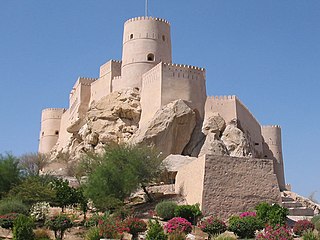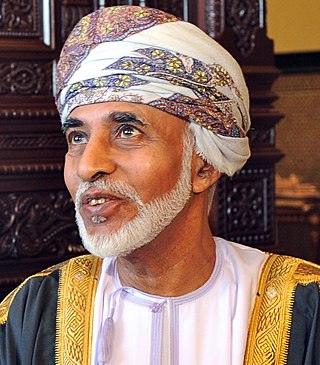 |
|---|
|
| Cabinet |
General elections were held in Oman in 1994. They were the first elections in a Gulf Arab country in which women could both vote and stand as a candidate. [1]
 |
|---|
|
| Cabinet |
General elections were held in Oman in 1994. They were the first elections in a Gulf Arab country in which women could both vote and stand as a candidate. [1]
Following the country's first national census in 1993, the electoral system was modified slightly from that used for the 1991 elections in which each wilayah was represented by one member in the Consultative Assembly. The 20 wilayahs with a population of over 30,000 were granted an extra representative, increasing the number of elected members from 59 to 80. [2]
Single seat wilayahs elected two candidates and two-seat wilayahs elected four, of which half were chosen by Fahd bin Mahmoud al Said and Sultan Qaboos to sit in the Consultative Assembly. [2]
Although women had been able to vote in the 1991 elections, they had not been able to stand as candidates. However, the 1994 elections saw women able to stand in seats in the Muscat Governorate. [2]
Female candidates won two seats; [3] Shakour bint Mohammed al-Ghamari in Muscat and Taiba al-Mawali in Seeb. [2]

Oman, officially the Sultanate of Oman, is a country located in West Asia. It is situated on the southeastern coast of the Arabian Peninsula, and spans the mouth of the Persian Gulf. Oman shares land borders with Saudi Arabia, the United Arab Emirates, and Yemen, while sharing maritime borders with Iran and Pakistan. Oman has a population of 5,492,196 and is ranked the 120th most populous country in the world.

Oman is the site of pre-historic human habitation, stretching back over 100,000 years. The region was impacted by powerful invaders, including other Arab tribes, Portugal and Britain. Oman once possessed the island of Zanzibar on the east coast of Africa as a colony. Oman also held Gwadar as a colony for many years.

The Politics of Oman take place in a framework of an absolute monarchy, where the Sultan of Oman is both head of state and head of government. The Sultan is hereditary, who appoints a cabinet to assist him. The sultan also serves as the supreme commander of the armed forces and prime minister.

Muscat is the capital and most populated city in Oman. It is the seat of the Governorate of Muscat. According to the National Centre for Statistics and Information (NCSI), the total population of Muscat Governorate was 1.72 million as of September 2022. The metropolitan area spans approximately 3,500 km2 (1,400 sq mi) and includes six provinces called wilayats, making it the largest city in the Arabian Peninsula by area. Known since the early 1st century AD as an important trading port between the west and the east, Muscat was ruled by various indigenous tribes as well as foreign powers such as the Persians, the Portuguese Empire and the Ottoman Empire at various points in its history. A regional military power in the 18th century, Muscat's influence extended as far as East Africa and Zanzibar. As an important port-town in the Gulf of Oman, Muscat attracted foreign tradesmen and settlers such as the Persians, Balochs and Sindhis. Since the ascension of Qaboos bin Said as Sultan of Oman in 1970, Muscat has experienced rapid infrastructural development that has led to the growth of a vibrant economy and a multi-ethnic society. Muscat is termed as a Beta - Global City by the Globalization and World Cities Research Network.

Qaboos bin Said Al Said was Sultan of Oman from 23 July 1970 until his death in 2020. A fifteenth-generation descendant of the founder of the House of Al Said, he was the longest-serving leader in the Middle East and Arab world at the time of his death, having ruled for almost half a century.

Muttrah, administratively a wilayah (province), is located in the Muscat Governorate of Oman. Before the discovery of oil in Oman, Muttrah was the center of commerce in Oman (Muscat). It is still a center of commerce as one of the largest sea ports of the region is located there. Other landmarks include Souq Muttrah, a traditional bazaar and Sour Al-Lawatiah, a small community of houses surrounded by an old wall. To the south lies Muscat District.

The National Assembly is the unicameral legislative house of the Parliament of Mauritania. The legislature currently has 176 members, elected for five-year terms in electoral districts or nationwide proportional lists.

The Consultative Assembly is the lower house of the Council of Oman. It is the only legislative body in Oman of which all members are democratically elected. The other chamber of the parliament is the Council of State.

Oman is an absolute monarchy in which all legislative, executive, and judiciary power ultimately rests in the hands of the hereditary sultan, and in which the system of laws is based firmly on the monarchs made laws. Although a report by the U.S. State Department, based on conditions in 2010, summed up the human rights situation in the country by asserting that the government "generally respected the human rights of its citizens,", several international human-rights groups have described the state of human rights in Oman in highly critical terms. Article 41 of Oman's statute (constitution) criminalizes any criticism of the sultan, stating that "the sultan's person is inviolable and must be respected and his orders must be obeyed".

This page list topics related to Oman.

General elections was held in Oman on 15 October 2011 to choose 84-members of the Consultative Assembly.

The 2011 Omani protests were a series of protests in the Persian Gulf country of Oman that occurred as part of the revolutionary wave popularly known as the "Arab Spring".

Women in Oman now pursue careers and professional training, moving from their previous and traditional role at home to the public sphere. In Oman, 17 October is celebrated every year as the Omani Women's Day with various pro-female events.

General elections for the Consultative Assembly were held in Oman on 25 October 2015.

General elections were held in Oman on 14 September 2000. They were the first direct elections in the country's history.

General elections were held in Oman for the first time in 1991.

General elections were held in Oman on 16 October 1997.
Shakour bint Mohammed al-Ghamari is an Omani politician. In 1994, she and Taiba al-Mawali were indirectly elected to the Consultative Assembly, becoming the first women in the Parliament of Oman.
Taiba bint Mohammad al-Mawali is an Omani politician. In 1994, she and Shakour bint Mohammed al-Ghamari were indirectly elected to the Consultative Assembly, becoming the first women in the Parliament of Oman.

Lujaina Mohsin Haider Darwish is an Omani politician. Along with Rahila Al Riyami, she was one of the first two women to be directly elected to the Consultative Assembly in 2000. In 2015 she was appointed to the Council of State. Darwish is also the chairperson of ITICS at Mohsin Haider Darwish.